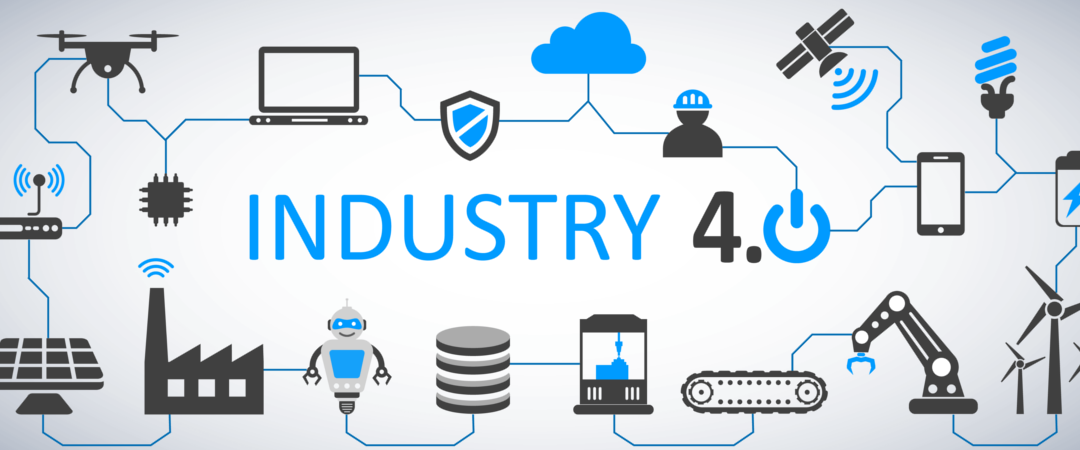Industry 4.0 is a concept that refers to the notion of industrial revolution in relation to the modern interplay of automation, data processing and exchange, and manufacturing techniques. Industry 4.0 is not only about technology, but also about new ways of working and the role of people in industry. It is a collective term for the techniques and operating principles of value chain organizations collectively applying or using cyber-physical systems, the Internet of Things (IoT) and cloud computing.
The beginning of the 21st is the time when people are starting to talk about the fourth industrial revolution. It was pioneered by the Internet of Things (Internet of Things), which is the transmission of large amounts of data, advanced methods of processing it and Big Data – technology for analyzing large data sets. The concept of Industry 4.0 consists of several elements: the integration of intelligent machines, systems and the change of production processes. It is based on aggregate data processing, which is expected to result in reduced production costs while increasing efficiency and streamlining logistics. The fourth revolution is also associated with innovations and integration along the human-robot line – barriers between the two are disappearing, resulting in more flexible production, and in general with a change in the way people work and their role in industry.
The notion of Industry 4.0 thus means the unification of the real world of production machinery with the virtual world of the Internet and information technology. People, machines and IT systems automatically exchange information in the course of production – within the factory and across the various IT systems operating in the company. Industry 4.0 encompasses the entire value chain: from placing an order and supplying components for ongoing production to shipping goods to customers and after-sales services. The Industry 4.0 environment supports the workforce like never before by providing access to virtually any useful information, at any time, from any place, enabling cost-effective production of individualized products and short runs (so-called Mass Customization).
The Fourth Industrial Revolution describes a complex process of technological and organizational transformation of enterprises, which includes the integration of the value chain, the introduction of new business models and the digitization of products and services. The implementation of these solutions is made possible through the use of new digital technologies, data resources and the provision of communication in a network of cooperation between machines, devices and people. Driving the transformation are the increasingly personalized needs of customers and the growing trend of personalizing products and services.
Soon, in a well-organized factory, the only fixed elements will be the walls, roof and floor. Traditional production lines will be replaced by modules that, either autonomously or under human supervision, will put together in such a way as to fulfill incoming orders as quickly as possible.
In order for the fourth-generation industry to develop smoothly, it is necessary for companies to cooperate smoothly on individual technological solutions. There are several key factors that lead to the development of ideas:
(a) Increasing awareness of the benefits that a company can achieve by implementing Industry 4.0 solutions,
(b) the growth of skilled IT staff,
(c) proper management of supply chains,
(d) a change in the profile of the consumer to one that will force changes on companies.
The Fourth Industrial Revolution will change the face of the workforce. However, innovations are not created through repetitive activities, but through new ideas and creative thinking. Employees equipped with digital solutions can rely less on muscle power and more on the power of their minds. Automation and intelligent processes are primarily intended to support humans, not replace them.
The ongoing digital transformation is forcing the need for specialists with knowledge of the latest industrial solutions, but especially competencies related to managing and implementing effective digitization strategies in the era of the fourth industrial revolution. We want the MBF Group company to actively participate in this revolution while being a part of it. This requires an enormous amount of work and many hours of meetings and negotiations. The most important thing, however, is to report success at the end.
Bibligraphy:
https://pl.wikipedia.org/wiki/Czwarta_rewolucja_przemys%C5%82owa
https://przemysl-40.pl/index.php/2017/03/22/czym-jest-przemysl-4-0/
https://przemyslprzyszlosci.gov.pl/tag/przemysl-4-0/#desc-bottom
https://mfiles.pl/pl/index.php/Przemys%C5%82_4.0
https://przemyslprzyszlosci.gov.pl/przemysl-4-0-teraz-jeszcze-bardziej-potrzebny
https://zrobotyzowany.pl/wiedza/4044/czym-jest-przemysl-4-0-i-jakie-korzysci-niesie-ze-soba-dla-przedsiebiorstw
https://www.sap.com/poland/insights/what-is-industry-4-0.html
https://builderpolska.pl/2020/01/08/przemysl-4-0-przyszlosc-ktora-dzieje-sie-dzis/
https://www.ibm.com/pl-pl/industries/industrial/industry-4-0
https://www.hays.pl/blog/insights/czy-przemysl-4-0-znaczaco-wplynie-na-wyzwania-rekrutacyjne-

 MBF Group
MBF Group























